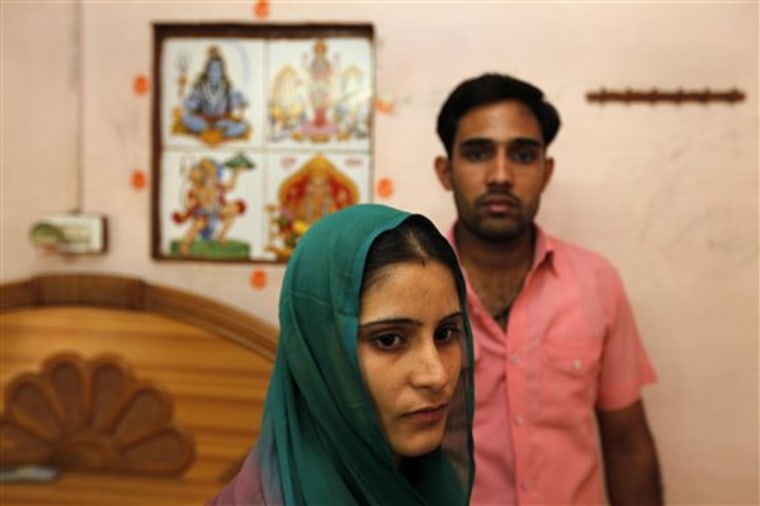Deep in a warren of dusty alleys in a north Indian village, an unmarked house serves as a refuge for a young couple who fear for their lives.
Ravinder Gehlaut and Shilpa Kadiyan were wedded in March of last year. Their families had arranged their marriage in the traditional way: each had checked out the other's caste, status and wealth. Everything had seemed fine.
But weeks later the whispers began. Village elders began dropping in on Ravinder's father's home in the village of Dharana, in Haryana state, saying the couple had violated a social taboo forbidding the marriage of people belonging to the same "gotra," a vague term connoting clan.
Soon, the village's "khap panchayat," or caste council, a powerful watchdog group of older men, declared the village had been dishonored. They gave the couple an ultimatum: get divorced, and in Shilpa's case, marry another man approved by the council.
When a mob threatened to kill them if they did not obey, they fled the village.
It is the contradiction of 21st-century India: Despite all the outward signs of modernity — glitzy malls, roaring economy, rising literacy — social change can be agonizingly slow. Even now, dowry demands grow ever higher, hundreds of thousands of female fetuses are aborted every year in sex-selective abortions and caste continues to dominate most people's lives.
Marriage, in many ways, has become the main battleground of tradition versus modernity.
Today, young people increasingly choose their own spouses. They are emboldened by an increasingly urbanized elite and a craze for movies that show young men and women falling in love, living together and choosing their own spouses.
Still, most marriages are still negotiated by parents and governed by strict codes based on caste, the ancient and deeply complex Hindu social system that places nearly everyone into one of four main castes and thousands of sub-castes. Parents seek their children's spouses in the same caste but not the same clan.
There lies the problem. In rural north India, residents of neighboring villages were traditionally seen as clanspeople, and thus siblings, which is why the caste council also demanded that Gehlaut and Kadiyan declare themselves brother and sister, even though the clans consist of tens of thousands of people and the couple couldn't possibly be called blood relatives.
A few years ago the caste councils indeed might have turned a blind eye. But as they find themselves increasingly marginalized by swift social change, they are enforcing the medieval kinship rules to reassert their dominance.
Defiance carries a high price. Couples are separated, ostracized, or even killed — more than 100 last year in Haryana state alone, according to government figures.
In Dharana, a village barely 80 kilometers (50 miles) from New Delhi, the capital, the caste council's orders soon turned to violence. In July last year, the family was given three days to leave the village. An angry mob armed with iron rods and sickles surrounded the Gehlaut home, threatening to kill the family.
The police arrived just in time, and gave the couple protection for a few weeks, but after getting reports their lives were in danger, they fled 100 kilometers (60 miles) to Sultanpur Dabas, where Gehlaut's extended family have sheltered them.
"They would have killed us if they had caught us," whispers the heavily pregnant Kadiyan, squatting awkwardly on the floor to make tea in the kitchen they share with six family members.
But they are luckier than others.
In 2007, Manoj Banwala, 23, and his 19-year-old bride Babli were kidnapped and hacked to death by Babli's brother and other relatives after they eloped and married despite being of the same clan. The killers have been sentenced to death, and the village chief to life in prison.
But far from acting as a deterrent, the verdict jolted village councils into action. They are now calling for a rewriting the Hindu laws that govern family matters to include a ban on same-clan marriages.
"There has been a resurgence of khap assertions to justify their stand in public," said Kirti Singh, a Supreme Court lawyer.
Singh said that during the Haryana courts' summer recess, when only emergency cases are heard, more than half the cases are from young couples seeking protection.
Official reports say 19 young lovers were killed in April and May alone, including a couple in New Delhi who were electrocuted and beaten to death by members of the wife's family for breaching caste and gotra rules.
The bloodshed prompted the Supreme Court last month to order affected state governments to file reports and describe what they are doing to stop the killing. The Indian government is also moving to tighten the laws.
Prem Chowdhry, who has studied the region's caste issues, says urbanization, education and TV have left the male-only councils "feeling sidelined and insecure ... Their dominance in the village is being challenged."
Those village elders see it very differently.
Baljit Singh Mallik, who heads the council in the village of Gathwala and oversees a larger grouping of 63 village councils, insists the rules are important for preserving custom and tradition.
"Gotra rules have always governed marriage customs in northern India," he said.
The village councils still have obvious political clout. Even some of India's younger, modern-minded politicians have defended them.
Ravinder Gehlaut says he and his wife asked their legislator for help and were rebuffed.
"These are young leaders, We expect them to be modern in their outlook," he said. "But they are lending support to such medieval practices."
Still, the couple are determined to fight. They have filed a police complaint against their tormentors.
